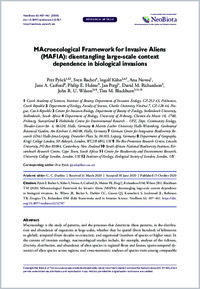MAcroecological Framework for Invasive Aliens (MAFIA): disentangling large-scale context dependence in biological invasions
- Pyšek, Petr Czech Academy of Sciences, Institute of Botany, Department of Invasion Ecology, CZ-252 43, Průhonice, Czech Republic - Department of Ecology, Faculty of Science, Charles University, Viničná 7, CZ-128 44, Prague, Czech Republic - Centre for Invasion Biology, Department of Botany & Zoology, Stellenbosch University, Stellenbosch, South Africa
- Bacher, Sven Department of Biology, University of Fribourg, Chemin du Musée 10, 1700, Fribourg, Switzerland
- Kühn, Ingolf Helmholtz Centre for Environmental Research – UFZ, Dept. Community Ecology, Theodor-Lieser-Str. 4, 06120, Halle, Germany - Martin Luther University Halle-Wittenberg, Geobotany/ Botanical Garden, Am Kirchtor 1, 06108, Halle, Germany - German Centre for Integrative Biodiversity Research (iDiv) Halle-Jena-Leipzig, Deutscher Platz 5e, 04103, Leipzig, Germany
- Novoa, Ana Czech Academy of Sciences, Institute of Botany, Department of Invasion Ecology, CZ-252 43, Průhonice, Czech Republic
- Catford, Jane A. Department of Geography, King’s College London, 30 Aldwych, London, WC2B 4BG, UK
- Hulme, Philip E. The Bio-Protection Research Centre, Lincoln University, PO Box 85084, Canterbury, New Zealand
- Pergl, Jan Czech Academy of Sciences, Institute of Botany, Department of Invasion Ecology, CZ-252 43, Průhonice, Czech Republic
- Richardson, David M. Centre for Invasion Biology, Department of Botany & Zoology, Stellenbosch University, Stellenbosch, South Africa
- Wilson, John R. U. Centre for Invasion Biology, Department of Botany & Zoology, Stellenbosch University, Stellenbosch, South Africa - South African National Biodiversity Institute, Kirstenbosch Research Centre, Cape Town, South Africa
- Blackburn, Tim M. Centre for Invasion Biology, Department of Botany & Zoology, Stellenbosch University, Stellenbosch, South Africa - Centre for Biodiversity and Environment Research, University College London, London, UK - Institute of Zoology, Zoological Society of London, London, UK
-
15.10.2020
Published in:
- NeoBiota. - 2020, vol. 62, p. 407–461
English
Macroecology is the study of patterns, and the processes that determine those patterns, in the distribution and abundance of organisms at large scales, whether they be spatial (from hundreds of kilometres to global), temporal (from decades to centuries), and organismal (numbers of species or higher taxa). In the context of invasion ecology, macroecological studies include, for example, analyses of the richness, diversity, distribution, and abundance of alien species in regional floras and faunas, spatio-temporal dynamics of alien species across regions, and cross- taxonomic analyses of species traits among comparable native and alien species pools. However, macroecological studies aiming to explain and predict plant and animal naturalisations and invasions, and the resulting impacts, have, to date, rarely considered the joint effects of species traits, environment, and socioeconomic characteristics. To address this, we present the MAcroecological Framework for Invasive Aliens (MAFIA). The MAFIA explains the invasion phenomenon using three interacting classes of factors – alien species traits, location characteristics, and factors related to introduction events – and explicitly maps these interactions onto the invasion sequence from transport to naturalisation to invasion. The framework therefore helps both to identify how anthropogenic effects interact with species traits and environmental characteristics to determine observed patterns in alien distribution, abundance, and richness; and to clarify why neglecting anthropogenic effects can generate spurious conclusions. Event-related factors include propagule pressure, colonisation pressure, and residence time that are important for mediating the outcome of invasion processes. However, because of context dependence, they can bias analyses, for example those that seek to elucidate the role of alien species traits. In the same vein, failure to recognise and explicitly incorporate interactions among the main factors impedes our understanding of which macroecological invasion patterns are shaped by the environment, and of the importance of interactions between the species and their environment. The MAFIA is based largely on insights from studies of plants and birds, but we believe it can be applied to all taxa, and hope that it will stimulate comparative research on other groups and environments. By making the biases in macroecological analyses of biological invasions explicit, the MAFIA offers an opportunity to guide assessments of the context dependence of invasions at broad geographical scales.
- Faculty
- Faculté des sciences et de médecine
- Department
- Département de Biologie
- Language
-
- English
- Classification
- Biological sciences
- License
-
License undefined
- Identifiers
-
- RERO DOC 329714
- DOI 10.3897/neobiota.62.52787
- Persistent URL
- https://folia.unifr.ch/unifr/documents/308956
Statistics
Document views: 374
File downloads:
- pdf: 315
